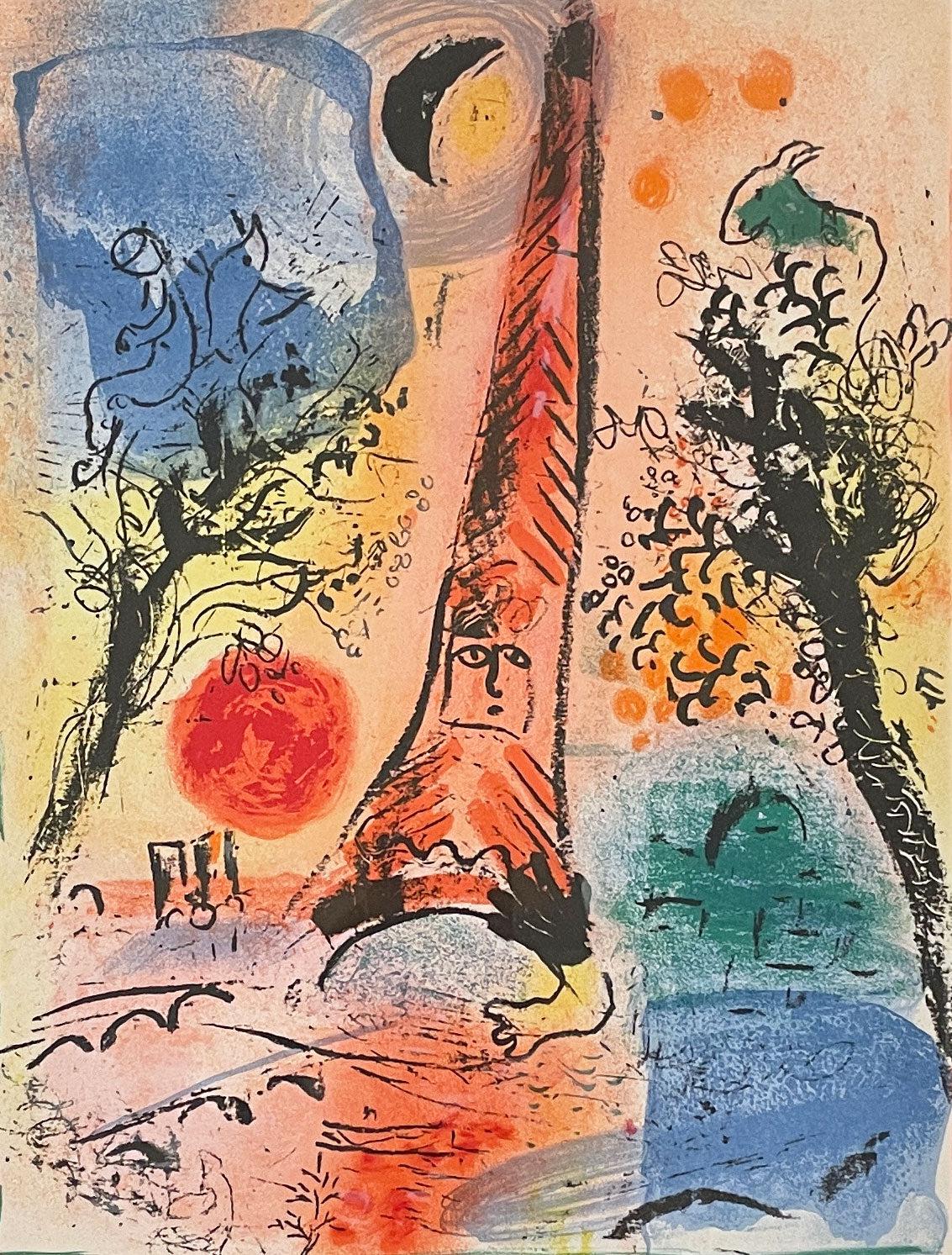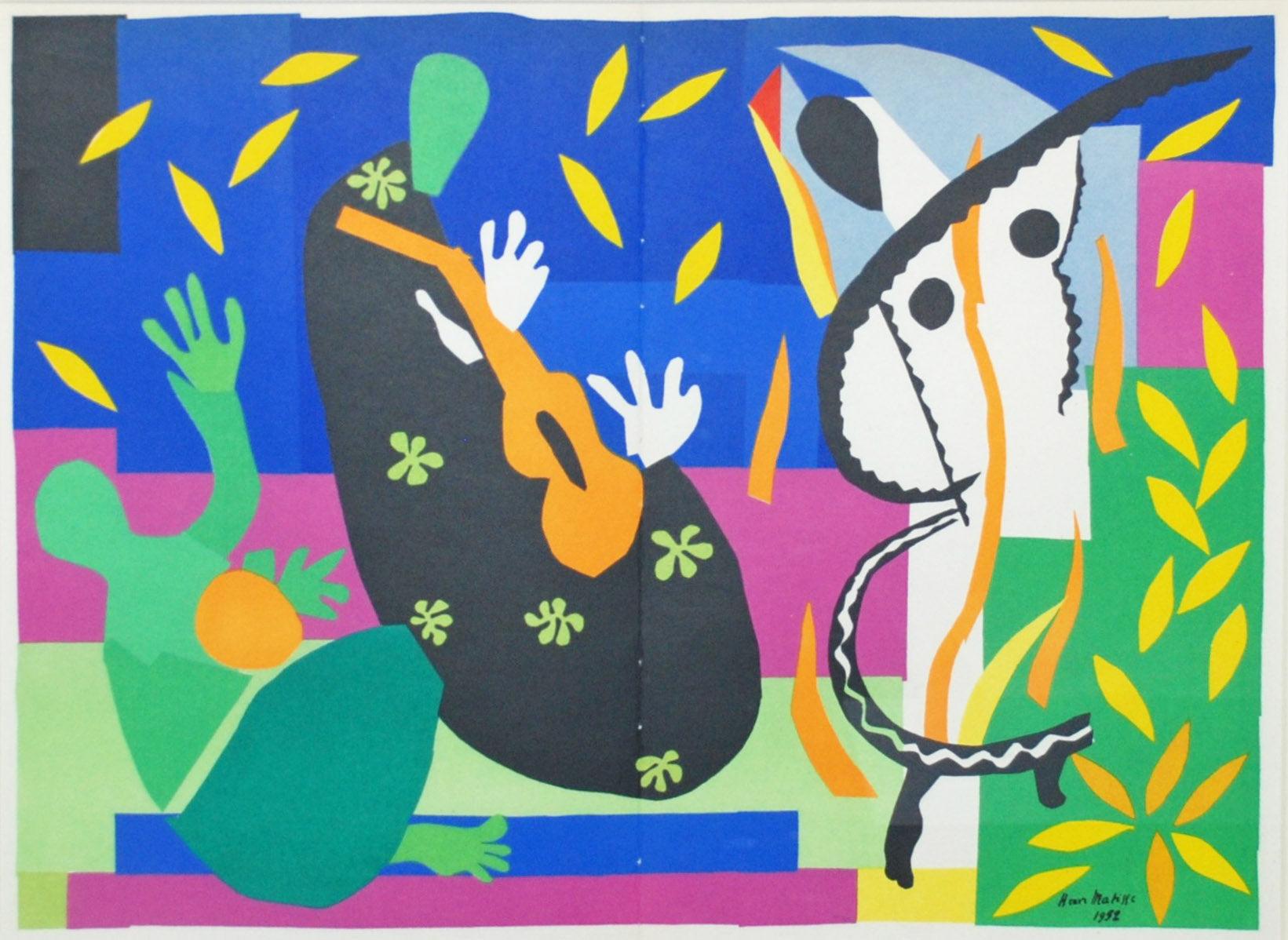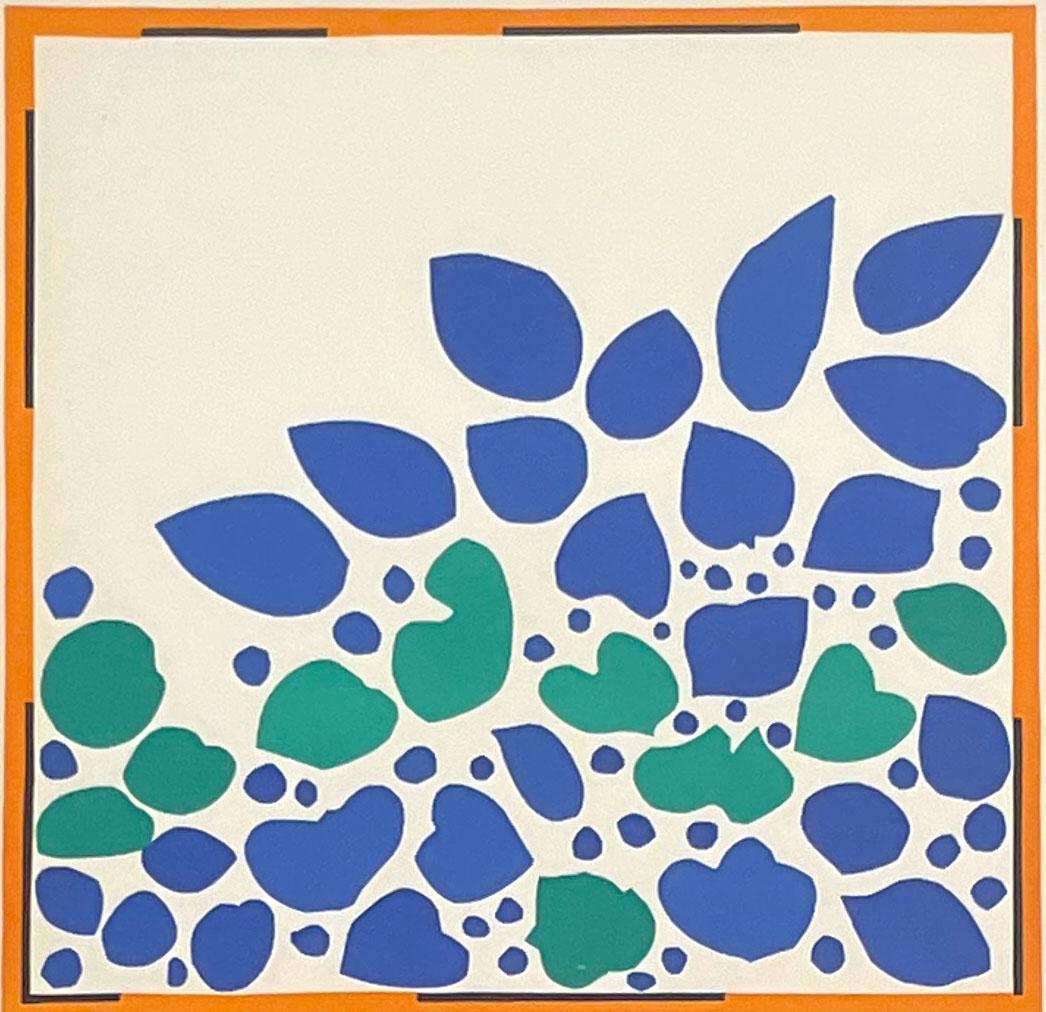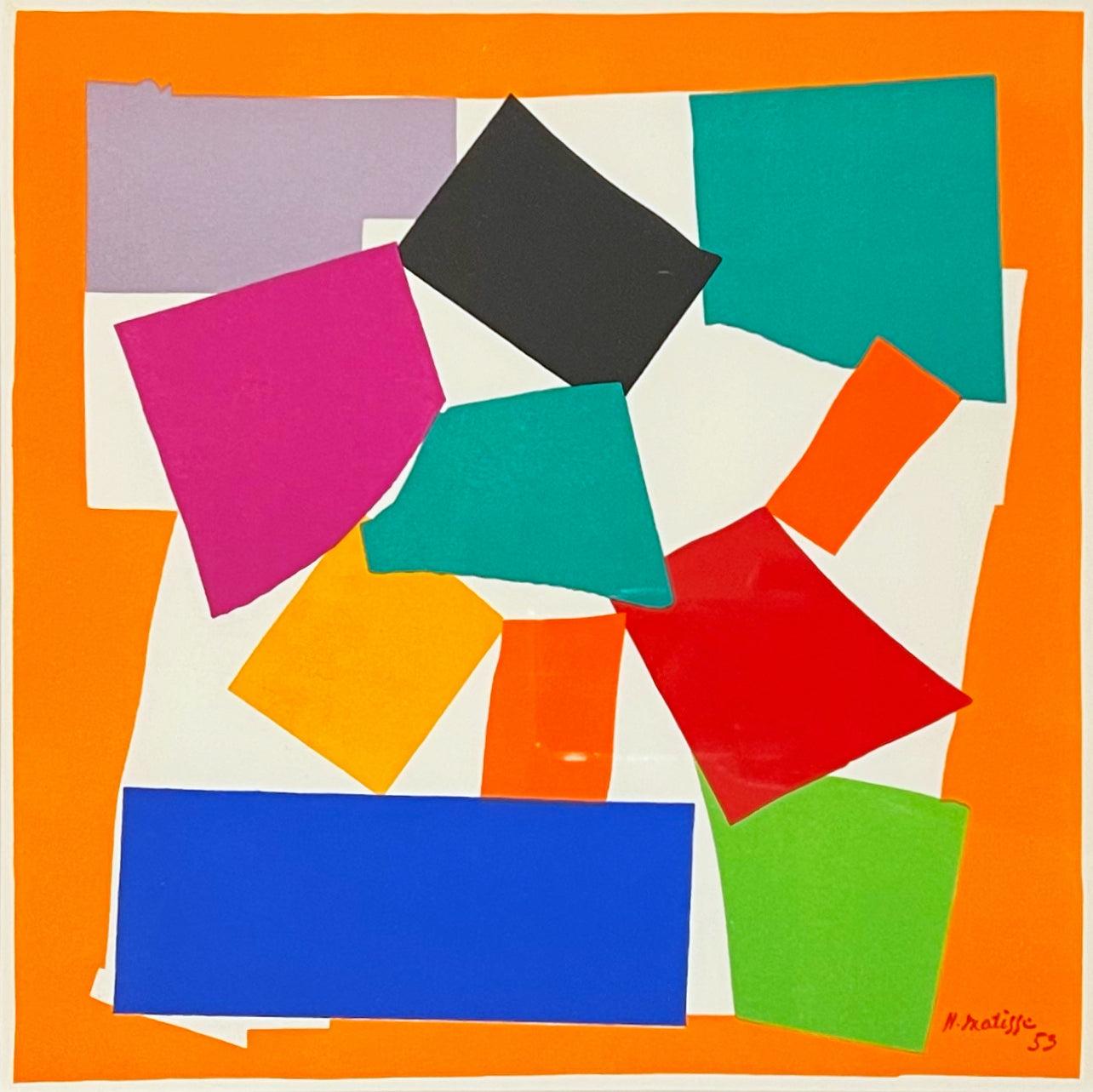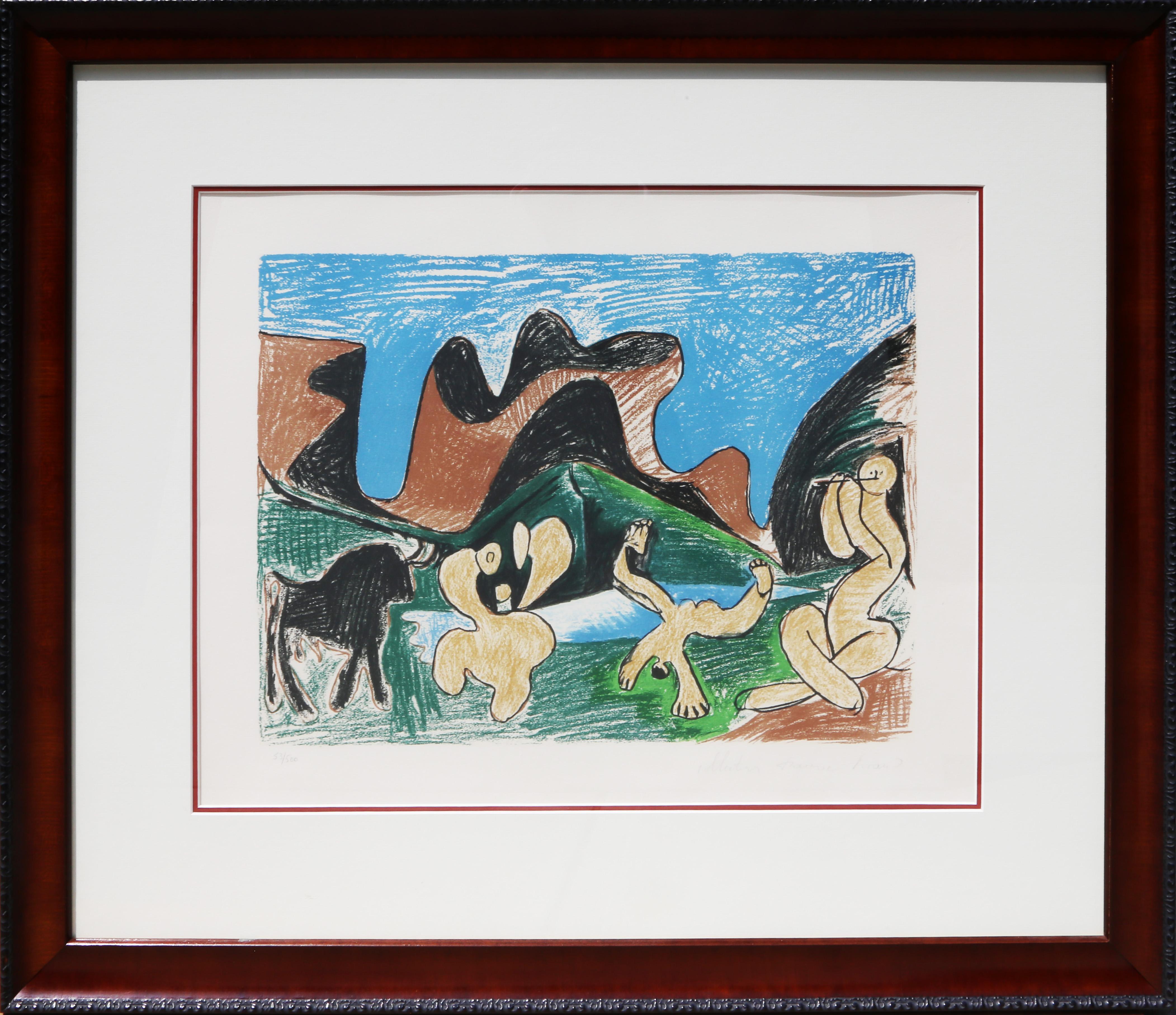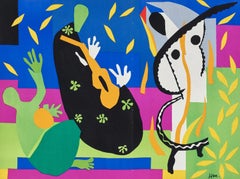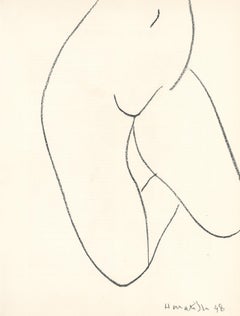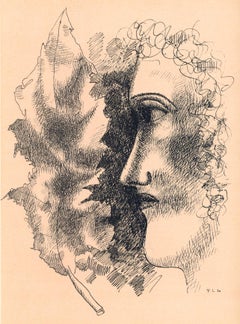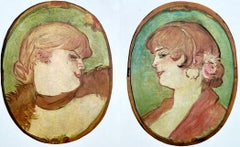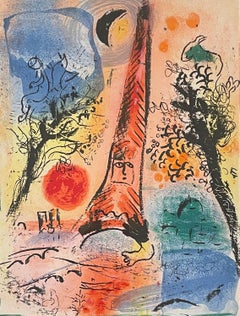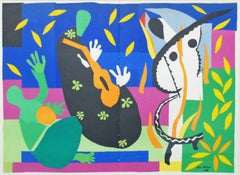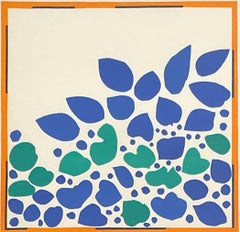Articoli simili a Matisse, Composition, Verve: Revue Artistique et Littéraire (after)
Vuoi altre immagini o video?
Richiedi altre immagini o video al venditore
1 di 10
Matisse, Composition, Verve: Revue Artistique et Littéraire (after)1953
1953
Informazioni sull’articolo
Lithograph on vélin des Papeteries du Marais paper. Paper Size: 14 x 10.25 inches. Inscription: Signed in the plate and unnumbered, as issued. Notes: From the album, Verve: Revue Artistique et Littéraire, Vol. VII, N° 27-28, 1953. Published by Éditions de la revue Verve, Paris, under the direction of Tériade, éditeur, Paris; printed by Mourlot Frères, Paris, January 15, 1953, in an edition of MM. Excerpted from the album (translated from French), This double issue of Verve was completed to print on January 15, 1953 by Draeger for typography and gravure and by Mourlot for lithography. Additional notes: Excerpted from Poppy Sfakianaki, ‘La revue Verve (1937–60): Un tremplin pour la carrière de Tériade dans les éditions d’art’, Journal of European Periodical Studies, 4.2 (Winter 2019), 70–89, In 1937, Tériade (1897-1983) met David Smart (1892-1952), the American publisher of Esquire magazine, who offered him to the opportunity to collaborate on the creation of 'the most beautiful magazine in the world'. Smart recognized in Tériade not only his ability as a publisher and knowledge of art history, but also his professional network and the name he made for himself in the Parisian art world—all crucial advantages for an editorial business. Having had the commercial conviction that beauty "sells", Smart intended to address the American public, attracted to French art, including Modern art, and the myth of artistic life in Paris. For his part, Tériade saw the proposed collaboration as an opportunity for a foray into the American market—a powerful ally of modern art in France. Éditions de la Revue Verve was founded in November 1937, largely funded by Smart, and directed by Tériade. Verve: Revue Artistique et Littéraire was a luxurious and ambitious art publication, published not only in French, but also in English in its early years, and distributed in Europe and the United States. Its configuration was reminiscent of that of the French art journals Cahiers d'art, Minotaure, and Arts et métiers graphiques, as well as that of the American art magazine, Coronet. However, Verve was superior to the competition because of its copious iconography and high printing quality. Its price varied between 60 and 150 francs (for double numbers) before the war, and between 120 and 350 francs during the war. Given its high price, the magazine mainly targeted art dealers, collectors, bibliophiles and wealthy art lovers. The exquisite aesthetics of the magazine was due to its editor-in-chief, Tériade, who sought to develop a platform for dialogue between image and text, visual arts and literature. The dominant factor of each issue remains its iconography, composed of reproductions of works by modern artists that Tériade admired, and 'masters', mainly of the French tradition, alongside photos and miniatures of medieval manuscripts. Tériade undoubtedly realized with his magazine an idea expressed in 1934 according to which books served as an 'ideal museum' or an exhibition where all the artistic masterpieces are gathered, which Malraux developed later in Le Musée imaginaire (Geneva: Skira, 1947), parts of which will appeared in Verve. During Second World War the periodicity of the journal changed, then irregular, and the less varied nature of the subjects treated. Thus, the issues published during the War (as well as in 1945 and 1946) were devoted exclusively to the reproduction of medieval illuminations. Finally, the special issues of the post-war period each present the recent production of a modern art painter. Only numbers 8 (1940) and 27-28 (1952) were an exception with a more varied summary. Verve's reception was positive as evidenced by several laudatory press articles throughout its run. The success of the magazine, Tériade's passion for modern art and medieval manuscripts, his admiration for the publications of Ambroise Vollard and Albert Skira, and his knowledge of the world of bibliophiles, soon led him to amplify his editorial activity. In 1943, despite the practical difficulties imposed by the war, his first artist's book was published, written and illustrated by Georges Rouault. Until 1975, Tériade published Éditions de la Revue Verve, nine books by modern artists, such as Henri Matisse, Pablo Picasso, Marc Chagall, Joan Miró, entirely composed (text and images) by the artists; seventeen books illustrated by recognized modern artists; an album of lithographs by Fernand Léger on Paris; two photographic albums by Henri Cartier-Bresson; two monographs on the artists André Beaudin and Francisco Borès; a luxurious series of reproductions of medieval illuminations; and, a series of portfolios on great French architecture. Ultimately, the comparative study of the journal and the editions of Verve: Revue Artistique et Littéraire illustrates the importance of the tacit relational dynamic that results from the relations of collaboration and exchange of symbolic capital based on common perceptions and interests, as well as on feelings of mutual friendship and appreciation of actors in the art world who share a visual and bibliophilic culture and thus contribute to the success of the journal and the publishing house.
HENRI MATISSE (1869-1954) was a French artist, known for his use of colour and his fluid and original draughtsmanship. He was a draughtsman, printmaker, and sculptor, but is known primarily as a painter. Matisse is commonly regarded, along with Picasso and Marcel Duchamp, as one of the three artists who helped to define the revolutionary developments in the plastic arts in the opening decades of the 20th century, responsible for significant developments in painting and sculpture.
Although he was initially labeled a Fauve (wild beast), by the 1920s he was increasingly hailed as an upholder of the classical tradition in French painting. His mastery of the expressive language of colour and drawing, displayed in a body of work spanning over a half-century, won him recognition as a leading figure in modern art.
- Anno di creazione:1953
- Dimensioni:Altezza: 35,56 cm (14 in)Larghezza: 26,04 cm (10,25 in)
- Tecnica:
- Movimento e stile:
- Dopo:Henri Matisse (1869-1954, Francese)
- Periodo:
- Condizioni:
- Località della galleria:Auburn Hills, MI
- Numero di riferimento:1stDibs: LU1465216383882
Informazioni sul venditore
4,9
Venditore Platino
Venditori Premium con valutazione 4.7+ e tempi di risposta entro 24 ore
Fondazione nel 1978
Venditore 1stDibs dal 2021
1.099 vendite su 1stDibs
Tempo di risposta standard: <1 ora
- SpedizioneRecupero del preventivo…Spedizione da: Auburn Hills, MI
- Politica di reso
Alcune parti di questa pagina sono state tradotte automaticamente. 1stDibs non può garantire che le traduzioni siano corrette. L’inglese è la lingua predefinita del sito.
Garanzia di autenticità
Nell’improbabile caso in cui si verifichi un problema con l’autenticità di un articolo, contattaci entro un anno per ottenere un rimborso completo. DettagliGaranzia di rimborso
Se il tuo articolo non corrisponde alla descrizione, è danneggiato durante il trasporto o non arriva, contattaci entro 7 giorni per un rimborso completo. DettagliAnnullamento entro 24 ore
Hai un periodo di tolleranza di 24 ore per annullare il tuo acquisto, senza necessità di fornire spiegazioni.Venditori professionali selezionati
I nostri venditori di livello internazionale devono aderire a rigorosi standard di servizio e qualità, garantendo l’integrità delle inserzioni.Garanzia miglior prezzo
Se scopri che un venditore ha pubblicato altrove lo stesso articolo a un prezzo più basso, applicheremo lo stesso prezzo.Consegna globale affidabile
La nostra rete di vettori leader del settore offre opzioni di spedizione specializzate in tutto il mondo, inclusa la consegna personalizzata.Altro da questo venditore
Mostra tuttoLa tristesse du roi (Duthuit 139), Verve: Revue Artistique et Littéraire
Di Henri Matisse
Lithograph on vélin des Papeteries du Marais paper. Paper Size: 14 x 20.50 inches, with centerfold, as issued. Inscription: Signed in the plate and unnumbered, as issued. Catalogue r...
Categoria
Anni 1950, Fauvismo, Stampe (paesaggio)
Materiali
Litografia
1.996 USD Prezzo promozionale
20% in meno
Spedizione gratuita
Matisse, Composition, Verve: Revue Artistique et Littéraire (after)
Di Henri Matisse
Lithograph on vélin des Papeteries du Marais paper. Paper Size: 14 x 10.25 inches. Inscription: Signed in the plate and unnumbered, as issued. Notes: From the album, Verve: Revue Art...
Categoria
Anni 1950, Fauvismo, Stampe (paesaggio)
Materiali
Litografia
716 USD Prezzo promozionale
20% in meno
Spedizione gratuita
Tête et Feuille, Verve: Revue Artistique et Littéraire
Di Fernand Léger
Litografia su carta vélin des Papeteries du Marais. Formato carta: 14 x 10,25 pollici. Iscrizione: Firmata nel piatto e non numerata, come da edizione. Note: Dall'album Verve: Revue ...
Categoria
Anni 1930, Fauvismo, Stampe figurative
Materiali
Litografia
716 USD Prezzo promozionale
20% in meno
Toulouse-Lautrec, Composizione, Derrière le miroir (dopo)
Di Henri de Toulouse-Lautrec
Litografia su carta vélin. Iscrizione: Non firmato e non numerato, come emesso. In buone condizioni, con piega centrale, come da edizione. Note: Da Derrière le miroir, n. 158-159, 19...
Categoria
Anni 1960, Postimpressionismo, Stampe figurative
Materiali
Litografia
716 USD Prezzo promozionale
20% in meno
Spedizione gratuita
Bonnard, Composizione, Derrière le miroir (dopo)
Di Pierre Bonnard
Litografia su carta vélin. Iscrizione: Non firmato e non numerato, come emesso. In buone condizioni, con piega centrale, come da edizione. Note: Da Derrière le miroir, n. 158-159, 19...
Categoria
Anni 1960, Postimpressionismo, Stampe figurative
Materiali
Litografia
716 USD Prezzo promozionale
20% in meno
Spedizione gratuita
Vuillard, Composizione, Derrière le miroir (dopo)
Di Edouard Vuillard
Litografia su carta vélin. Iscrizione: Non firmato e non numerato, come emesso. Buone condizioni. Note: Da Derrière le miroir, n. 158-159, 1966. Pubblicato da Aimé Maeght, Éditeur, P...
Categoria
Anni 1960, Postimpressionismo, Stampe figurative
Materiali
Litografia
716 USD Prezzo promozionale
20% in meno
Spedizione gratuita
Ti potrebbe interessare anche
Litografia del paesaggio urbano di Hong Kong
Di Ramon Moscardo Fernandez
Josep Moscardó (1953) - Cattedrale di Girona
Litografia - Firmata a mano
La litografia misura 54x76 cm.
Senza cornice.
Numerato 12/150
Barcellona, 1953
Pittore, scultore e disegnat...
Categoria
Anni 1990, Fauvismo, Stampe (paesaggio)
Materiali
Litografia
Visione di Parigi, litografia da Mourlot Lithographe I
Di Marc Chagall
Artista: Marc Chagall
Titolo: Visione di Parigi
Portafoglio: Litografia Mourlot I
Mezzo: Litografia
Anno: 1960
Edizione: Non numerato
Incorniciato Dimensioni: 22" x 19"
Dimensioni im...
Categoria
Anni 1960, Fauvismo, Stampe figurative
Materiali
Litografia
Henri Matisse (after) La Tristesse du Roi (La tristezza del re)
Di (after) Henri Matisse
Artista: Henri Matisse (dopo)
Titolo: La Tristesse du Roi (La tristezza del re)
Portfolio: Le ultime opere di Henri Matisse
Mezzo: Litografia
Anno: 1958
Edizione: 2000
Dimensioni tel...
Categoria
Anni 1950, Fauvismo, Stampe (paesaggio)
Materiali
Litografia
1.395 USD
Spedizione gratuita
Lierre
Di (after) Henri Matisse
Artista: Henri Matisse (dopo)
Medio: Litografia originale
Titolo: Lierre
Portfolio: Le ultime opere di Henri Matisse
Anno: 1958
Edizione: 2000
Incorniciato Dimensioni: 17" x 17"
Dime...
Categoria
Anni 1950, Fauvismo, Stampe (paesaggio)
Materiali
Litografia
L'escargot
Di (after) Henri Matisse
Artista: Henri Matisse (dopo)
Titolo: L'escargot
Portfolio: Le ultime opere di Henri Matisse
Mezzo: Litografia
Anno: 1958
Edizione: 2000
Incorniciato Dimensioni: 17" x 17"
Dimensioni...
Categoria
Anni 1950, Fauvismo, Stampe (paesaggio)
Materiali
Litografia
Baccanale, litografia cubista di Pablo Picasso (after) Pablo Picasso
Di Pablo Picasso
Una litografia della Marina Picasso Estate Collection dopo il dipinto di Pablo Picasso "Bacchanale". Il dipinto originale è stato completato nel 1922 circa. Negli anni '70, dopo la ...
Categoria
Anni 1980, Fauvismo, Stampe figurative
Materiali
Litografia
